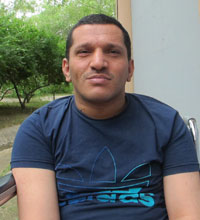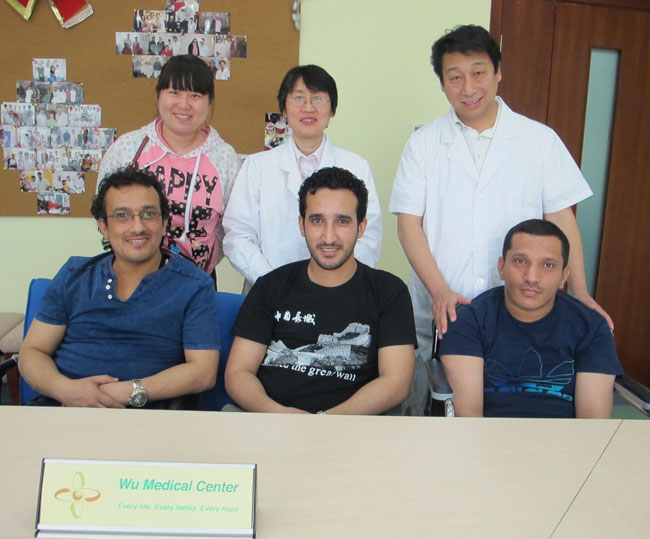Waled - Encephalitis sequela (Yemen) Posted on June 4, 2014
Name:Waled Hazem Okaish 
Sex: Male
Country: Yemen
Age: 36 years
Diagnosis: Encephalitis sequela
Date:April 05, 2014
Days Admitted to Hospital: 28days
Before treatment:
The patient suffered from malaria infection which caused hyperpyrexia and headache. 1 weeks later, the patient was in coma and was diagnosed with Malaria encephalitis. He received active treatment in a local ICU. About 20 days later, the patient recovered consciousness. But he had whole body muscle discordance. He also suffered from memory deterioration, cognitive function slow down and alalia. The patient received related therapy and the malaria was under control. This left damage to the brain tissue. The patient insisted on taking oral medication. But his condition had no improvement. He couldn't take care of himself completely. The damaged to memory, response and balance ability was aggravated in recent 3 months.
From the onset of the disease, the patient has good spirit. The sleep was almost normal. The diet was almost normal. He had diarrhea occasionally at night and reason was unclear. His urine was normal. His emotion was stable. Height and weight had no obvious change. The patient had no family genetic disease.
Admission PE:
Bp: 116/74mmHg; Hr: 83/min, Br: 19/min. Temperature: 36.2 degrees. The development and nutrition was normal. The skin and mucosa were normal, with no yellow stains. Thorax was symmetrical. Through auscultation, the respiratory sounds in both lungs were clear with no signs of dry or moist rales. The heart sounds were strong and the cardiac rhythm was regular, with no murmur in the valves. The abdomen was enlarged, with no masses. There were no swelling in both lower limbs.
Nervous System Examination:
Waled Hazem Okaish was alert. His spirit was ok, but his emotion was little fluctuating. He had slow response. His speech was not fluent. Articulation was unclear, and his language presented plosion. His calculation, orientation and recent memory were slowed down. Both pupils were equal in size and round, the diameter was 3.0mms. Both eyes were sensitive to light stimuli. The vision in both eyes was almost normal. Both eyeballs could move freely. Both eyes had obstacle to converge. There was no obvious nystagmus. The forehead wrinkle pattern was symmetrical. The bilateral nasolabial sulcus was equal in depth. The tongue was in the center of the oral cavity. There was no atrophy in tongue. The uvula was in the center of the oral cavity. Occasionally, his face had involuntary movement. The neck could move freely. He could turn his head and shrug his shoulders with strong muscle. The muscle strength of both upper limbs was at level 5. The muscle tone of both upper limbs was normal. The muscle strength of lower limbs was at level 4. The muscle tone of both lower limbs was normal. He could turn over and sit-up in bed. He had involuntary movement when he did the actions. He couldn't stand. The examination of deep and shallow sensation was almost normal. Bilateral abdominal reflexes was negative. The tendon reflex of left upper limb was normal. The tendon reflex of right upper limb reduced. The tendon reflex of both lower limbs reduced. He did the rapid rotation test in a clumsy manner. He had difficulty with the finger-to-nose test and the digit opposition test in an unstable manner. He did the heel-knee-shin test in a slow manner. There were no signs of meningeal irritation.
Treatment:
We initially gave Waled Hazem Okaish a complete examination, and he was diagnosed with Encephalitis sequela. The patient received treatment for nerve regeneration and to activate stem cells in his body. The patient received treatment to nourish the neurons, improve the blood circulation in order to increase the blood supply and nerve regeneration. This was accompanied with rehabilitation therapy.
Post-treatment:
The patient's calculation ability and recent memory have made some progresses. His emotion is more stable than before. He has better diet and sleep. His speech is clearer than before. He can control his speed better. The movement of tongue is more flexible. The ability to balance his sitting position and standing position are more stable. The involuntary movement has reduced. With assistance of a family member, he walks more easily than before. His hands did the finger-to-nose test and the rapid rotation test in a more stable manner.

